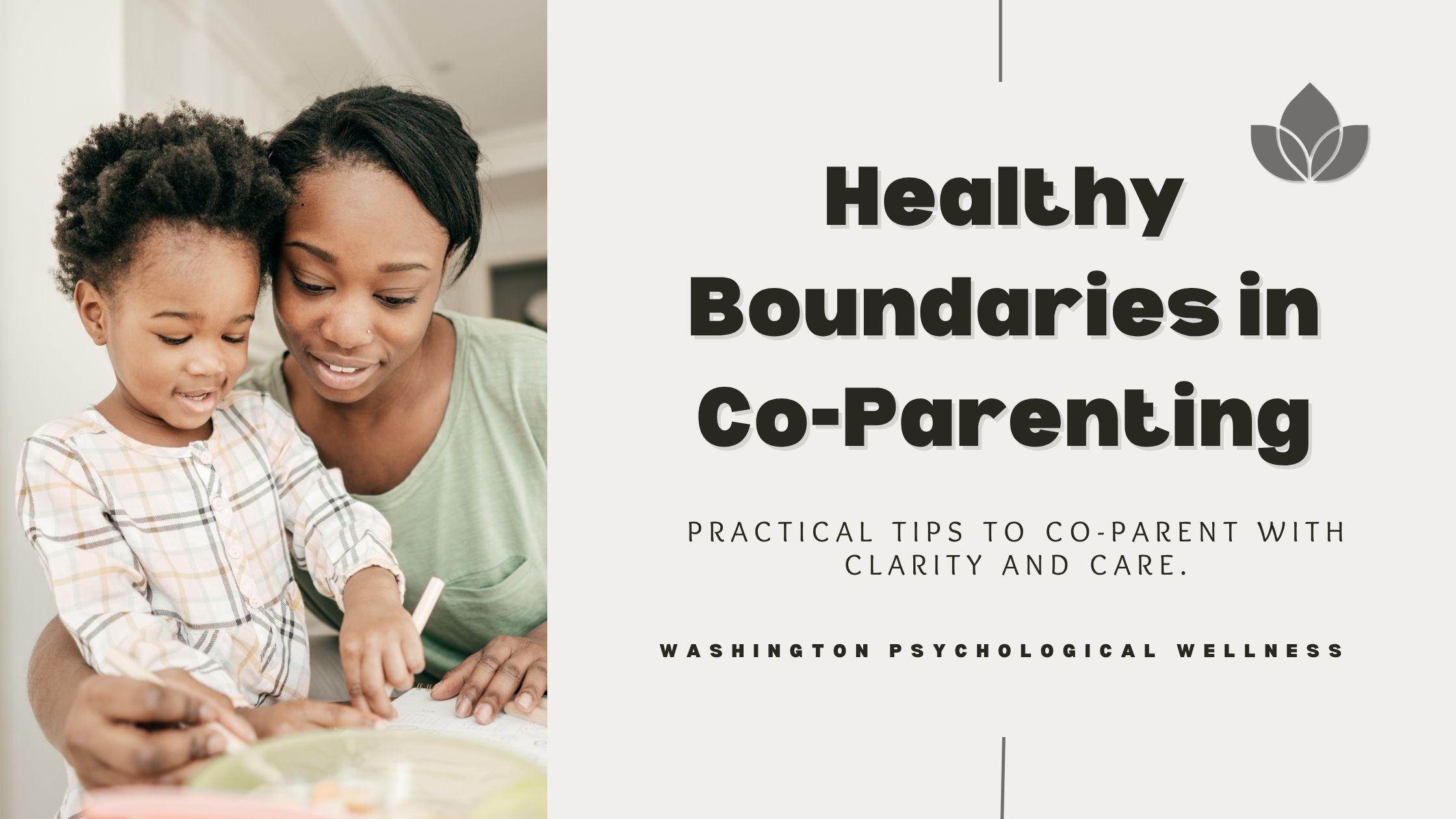
Setting Healthy Boundaries for Co-Parenting
By Washington Psychological Wellness | Serving Montgomery County, with offices in Rockville, and Gaithersburg, MD
Co-parenting can be one of the most rewarding—and challenging—relationship dynamics to navigate. Whether your separation was recent or happened years ago, the emotional residue of a past relationship can spill over into your parenting dynamic, making healthy boundaries feel difficult to define and maintain.
The truth is: setting boundaries in co-parenting isn’t about being cold or inflexible. It’s about creating respectful, stable structures that serve your child’s well-being and protect your own emotional health.
Here are some key steps for setting (and sustaining) healthy boundaries when co-parenting—especially when emotions run high or communication is strained.
Our Guide to Setting Healthy Boundaries for Co-Parenting
1. Prioritize Your Child’s Needs, Not Your Past Relationship
It’s easy to slip into old patterns, arguments, or power struggles. But co-parenting boundaries should always center around one guiding question:
“What’s best for my child?”
Ask yourself:
- Is this about control or creating consistency?
- Am I reacting from past wounds, or responding with my child’s needs in mind?
When you keep your focus on your child’s stability and emotional safety, clearer communication and calmer interactions naturally follow.
2. Define Roles and Responsibilities Clearly
Ambiguity creates confusion—for you, your co-parent, and your child. Even if it’s uncomfortable, agree on logistical expectations. This might include:
- Who handles pick-ups, drop-offs, and school communication
- Rules around bedtime, screen time, and discipline
- How to handle schedule changes or last-minute requests
Written agreements or co-parenting apps can help reduce misunderstandings and prevent your child from feeling caught in the middle.
3. Use Neutral, Respectful Communication
You don’t have to be best friends with your co-parent—but you do need respectful communication. Boundaries around how and when you communicate can protect both your mental health and your child’s peace of mind.
Tips include:
- Stick to parenting-related topics
- Use neutral platforms like OurFamilyWizard or TalkingParents
- Avoid sarcasm, blame, or venting—even when it’s tempting
Remember: you’re not doing this for your co-parent. You’re doing it for your child—and for your own peace.
4. Don’t Use Your Child as a Messenger
Even seemingly harmless messages like “Tell your dad I’ll be late” can place unnecessary emotional weight on your child. It can cause anxiety, confusion, or loyalty conflicts.
Whenever possible, communicate directly with your co-parent—even if it’s uncomfortable. This boundary protects your child from being the emotional go-between.
5. Respect Each Other’s Time and Parenting Style
Unless there is a safety concern, differences in parenting styles don’t necessarily mean something is wrong. One parent may emphasize structure; the other may be more relaxed. That’s okay.
Consistency is important—but co-parenting is about collaboration, not control. You can hold your values while respecting theirs, as long as both homes prioritize the child’s well-being.
6. Establish Boundaries Around Personal Life
It’s completely appropriate to limit discussions that veer outside of co-parenting. You’re not obligated to share updates on your dating life, work stress, or personal emotions.
Try something like:
“Let’s keep our communication focused on parenting decisions moving forward.”
Boundaries are healthiest when they’re clear, kind, and consistent.
7. Get Support When Needed
Even the most cooperative co-parents run into challenges. If you’re struggling with emotional residue from the relationship, mismatched communication styles, or high-conflict dynamics, you don’t have to figure it out alone.
At Washington Psychological Wellness, we offer:
- Family therapy
- Co-parenting coaching
- Tools for conflict resolution and emotional regulation
Our goal is to help you build boundaries that protect your child, reduce stress, and promote long-term cooperation—even in the most difficult circumstances.
Support for Co-Parents in Montgomery County, MD
Whether you’re new to co-parenting or looking to strengthen a long-term arrangement, Washington Psychological Wellness is here to help. Our team of therapists and coaches in Gaithersburg and Rockville, MD provides personalized support to help you navigate co-parenting with confidence, compassion, and clarity.
Schedule your free 15-minute consultation or meet our team to learn more.
